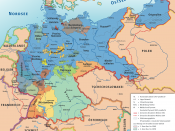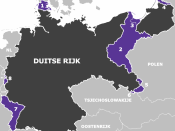The Weimar Republic was the first attempt to create a liberal democratic government in Germany. Looking at other democratic governments' success, the Germans thought that this action would help them get up on their feet again. However, the Weimar Republic was produced in a time of severe conflict between political and civil groups, and eventually gave in to the rise of Hitler and Nazi Germany. It was very weakly structured, which was where most of it's problems came from. The unlimited situational power of the president, the never-ending conflicts between left- and right-wing parties and Germany's weak economy were several severe problems Germany faced at the time.
Under the new Weimar constitution, the people voted for their president and government (Reichstag), which would in turn choose the country's ministers. The president had the power to control the army, which can't be considered much of a power, since the army was against the new constitution and failed to take orders.
However, the president had much more power than that. Under Article 48, the president had the ability to seize sole power over the whole country whenever necessary. This power enabled him to do anything, including to appoint/dismiss ministers and parties. The use of this power rendered the vote of the people worthless, because the president could change it as he pleased without the people approving. The use of article 48 was limited to emergency situations only, but since the severity of a situation was evaluated by the president himself, he could use the article to seize power whenever he felt like it. This was a big problem because it made people angry that their opinion was not worth anything and that even though the new government was democratic, this clause could turn it into an autocratic government at any time.
The voting system in the Weimar Republic was based on proportional representation, which meant that the allocation of seats in parliament was based on the votes cast for each party. Through this, every party, big or small, given the enough votes, could have a seat in the parliament. This was very unstable because every party had a different resolution in mind, which caused conflicts and disagreement inside the parliament. These disagreements elevated to the handful of assassinations during that time period. The foreign minister of SPD, Walther Rathenau, and Erzberger, one among those that signed the Treaty of Versailles, were both assassinated. This was a big issue with the Weimar Republic because without a well-cooperating government, there is no way Germany could operate effectively, and this directly influenced people's lives.
The economic power of the Weimar republic was extremely problemous. With high unemployment, loss of labor force due to the First World War (2 million men died), and hyper inflation, Germany was unable to pay the reparations forced upon it by the Treaty of Versailles, and people were having difficulties getting enough food to barely survive. So Germany started borrowing money from the US. From 1924 - 1929, Germany had received $9 billion worth of loans from the US. It is safe to say that that money was what Germany was living off of during all those years. So, when the Great Depression, happened, and Germany suddenly found itself without any kind of money, the economy fell apart. Suddenly unemployment jumped up, production couldn't keep with the needs of the people, and many industries and farmers went bankrupt. Germany was poverty-stricken. This became a big problem because without money Germany had no space for development, people were starving, and it was extremely easy for parties like the Nazi to seize control due to Germany's internal weakness at the time.
With all the assassinations, economic crises, and internal-government conflicts, the Weimar Republic was slowly breaking down. It was weak and vulnerable, and that was a great opportunity for Hitler and the Nazi party to take control.



Good job.
Everything is in it.
1 out of 1 people found this comment useful.